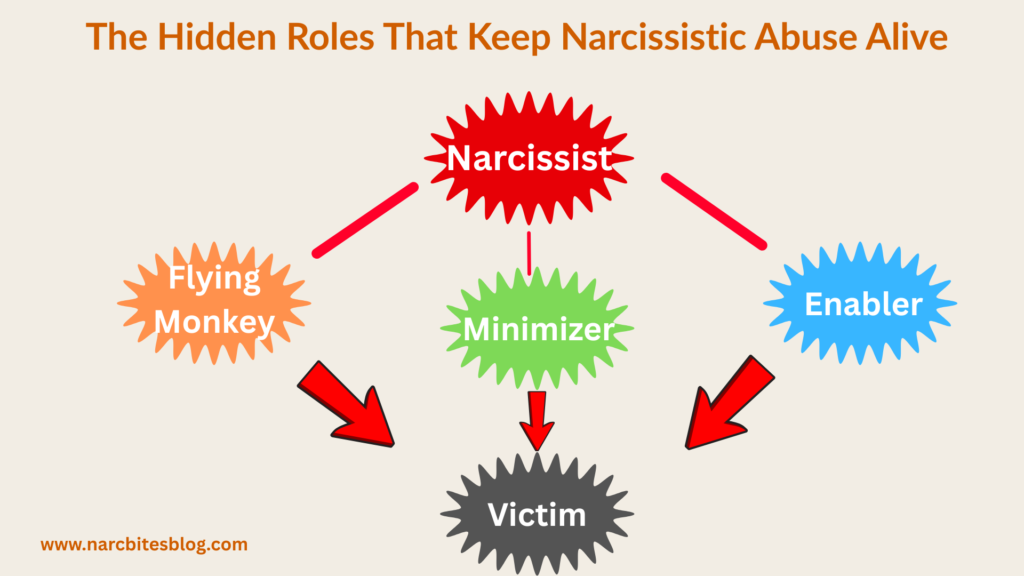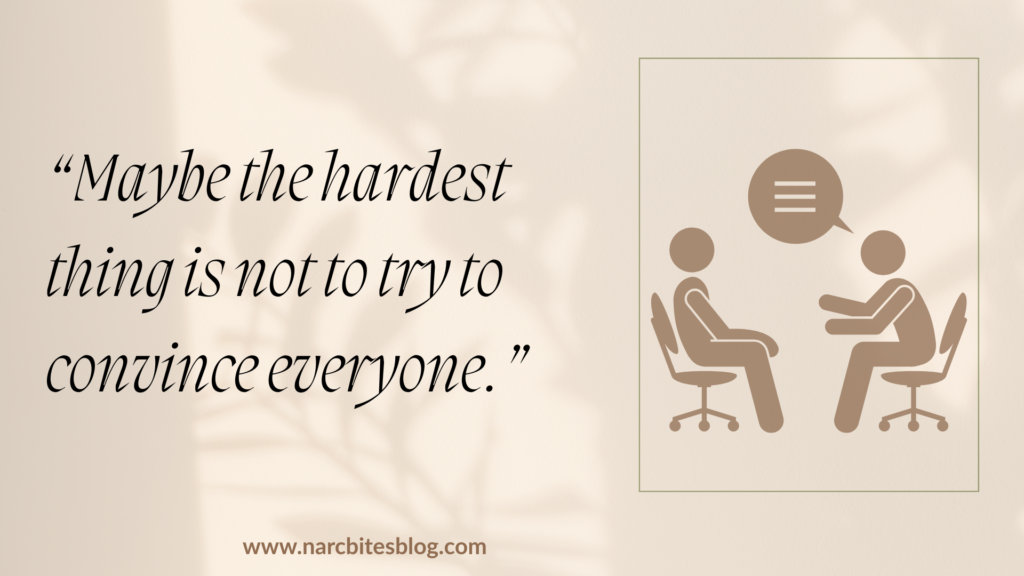When you hear the word narcissistic abuse, you usually imagine a relationship dynamic where one party is the narcissistic abuser and the other is the victim. Someone who manipulates, controls, and makes other people’s lives hell. And of course, this is true. But if we look closer, there are side characters in this narcissistic dynamic. They are people the narcissist uses to maintain the appearance they have built around themselves and to hold on to their power. Whether consciously or unconsciously, these people contribute to it.
Victims of narcissistic abuse often say that even during the relationship they felt cut off, isolated from others. Some say their own family turned against them and sided with the narcissist. They gave the narcissist the right and accused the victim of being unbearable, hysterical, or of never being satisfied. The narcissist basically treats these people as the extensions of their own hands, using them practically to do the dirty work for them. The expression flying monkey may be familiar to many people who deal with narcissistic dynamics, but let us see what other ways there are in which the supporters of abuse may appear, those who you should not overlook.
There are always a few patterns that keep showing up in these situations. Not everyone around the narcissist is abusive in the obvious way, but many of them, without even realizing it, end up holding the whole thing together. Some carry the narcissist’s words, some soften the truth, some cover things up. None of it looks too dangerous at first, but for the victim it adds up until it feels like the whole world is against them
Flying Monkey and Other Roles That Support Narcissistic Abuse
1.The Flying Monkey: Carrier of the Narcissist’s Agenda
The expression flying monkey comes from The Wizard of Oz, if you know the story, then it may be familiar from there, and basically the Wicked Witch of the West used these flying monkeys to do the dirty work instead of her. It works the same way with the narcissist: they don’t want to get their own hands dirty, they want to stay spotless, they want to keep their mask from slipping or cracking so the outside world doesn’t see their real face. So, by manipulating people from behind, they practically hand out the tasks in such a way that the flying monkeys don’t even realize they are being manipulated.
And what are these tasks? Practically, they repeat the accusations of the narcissist, they believe them, or they put pressure on you to apologize. Imagine if you complain to a flying monkey about how the narcissist treated you, they won’t sympathize with you, but will say things like “Don’t exaggerate already!” Or they say that you are the abuser because you say things that are not true, since the narcissist is always kind and helpful to them. But they were not there, they didn’t live through what happened, they have no idea. Yet, by repeating the words of the narcissist like a stuck record, your voice won’t be heard, you will look much less credible. On top of that, they often warn others not to deal with you because you are “crazy.”
Think about that situation when after many years you finally leave the abusive relationship, and one of your family members, while you are crying and complaining on the phone, says to you: “Why weren’t you able to take the dog out for a walk?” Even though you know you did everything else, and you were so tormented in the relationship that somet imes even breathing felt difficult…
2.The Minimizer: Voice That Shrinks the Survivor’s Reality
They don’t openly stand by them, but they try to make their faults and harm seem smaller. “I’m sure he didn’t mean it that way, I know him.” Or, “You know what she’s like.” That’s the kind of thing they say. At first, these may even sound reasonable, but inside you know it’s not the truth.
Imagine when you complain to someone close to you that the narcissist regularly mocked you or made cutting remarks, even in company. Instead of standing by you, the other person just says, “But that’s his humor.” Or at your workplace, when you complain to your colleague about your boss who humiliated you in a situation, the colleague just says, “But he treats everyone like that.” Minimizers are dangerous because they don’t start open arguments and they don’t loudly defend the narcissist. But their constant questioning of reality is just as exhausting and just as effective in destroying your sense of truth.
3.The Enabler: Shielding the Narcissist from Consequences
he flying monkey is the fighter, defender, and messenger. The minimizer is the quiet voice in your head that has been planted there. And the enabler is the pair of busy hands that always steps in and tries to fix things between you and the narcissist. They take it upon themselves to make sure the narcissist never faces the consequences of their own behavior. They protect the mask from being torn off, like you would see the narcissist’s mask always on, and the enabler holding it in place.
At the workplace, this could appear as a colleague who constantly finishes the tasks left half-done by the narcissistic boss, and at the same time says things like: “She’s under so much pressure, it wouldn’t be fair not to help her.” Or: “Don’t criticize her, you don’t know what you would do in her place.” In the family, it could be the enabler who encourages others not to pay attention to the narcissist’s angry outbursts and just let it go “for the sake of peace.” Enablers fill a peacemaking role, which may look useful on the surface. But in reality, they keep the cycle alive and make it possible for the narcissist to repeat the same behavior again and again without any accountability.
Why Flying Monkeys and Enablers Double the Pain
And if you are the survivor, this can be doubly painful. Not only do you have to fight the abuse itself, but also the fact that others don’t believe you, and actively defend the person who hurt you and destroyed your life. Most likely the narcissist already tried to isolate you from others during the relationship, and this doesn’t change after it ends. They still do it through the flying monkeys, the minimizers, and the enablers.
Because it’s one thing if one person abuses you, but if your friends, your family, and your colleagues excuse it, it is twice as painful. And you stand there alone, and feel that no one will help you, that you are completely alone. And it’s painful to say, but many times this is exactly the case.
How to Respond When a Flying Monkey or Enabler Targets You
The situation is that you can’t prevent people from taking on these roles. In most cases, they are manipulated too. But if you recognize the patterns, you can break them
- Set concrete boundaries. Say clearly what you want. If you say something too general like “This hurts me,” they won’t understand, or don’t want to understand. Instead, say something like: “I don’t want you to share with anyone what I tell you. If this happens, I won’t talk about it with you anymore.”
- Maybe the hardest thing is not to try to convince everyone. There are those who are too committed to the narcissist. Some stand by them because they depend on them. Others because they are afraid. Cognitive dissonance doesn’t help either, because these people have built up a picture of the narcissist. And what you try to make them understand is the exact opposite of that. At such times, the brain goes into defense mode and doesn’t allow the person to see reality. Facing the truth would break them.With these people, you will never be able to make them understand what you went through. Don’t waste your energy on it.
- Instead, look for real allies. Look for people who truly support you without judgment. Who listen, who respect your pace. Who don’t push you to forgive the narcissist, who don’t say “Get over it already.”
- Keep your own notes.When you’re in a narcissistic relationship, gaslighting distorts your memory and rewires your brain. As a result, you start to doubt yourself. If you write things down, you can always go back and read them. It gives you a point of reference that the narcissist’s lies can’t overwrite, and that no flying monkey can explain away.
- Keep your distance. This is maybe the hardest, because it’s about your family, your friends, your colleagues. But even in the name of love, abuse cannot be tolerated.
Why People Support Narcissists in the First Place
The reasons vary. Some are afraid of conflict and want peace at any cost. Others fear the narcissist or depend on them financially. Some are simply deceived by the charm and manipulation, they too fall into the trap. There are those who do see the truth. But they still think they gain more by siding with the narcissist than by opposing them. And then there’s cognitive dissonance, as I mentioned before. Whatever the reason, it may explain their behavior, but it never excuses it, and never justifies it.
Can a Flying Monkey or Enabler Ever Change?
In most cases, you can’t convince either the flying monkey or the minimizer of your truth. You can’t force the minimizer to face realities they don’t want to see. You can’t convince the enabler to stop covering up the narcissist’s faults when they think they are doing good.
But you can choose how you respond. You always have power over yourself. The best thing is to stop the endless debates. I know it is very hard to walk away from these situations because your sense of justice doesn’t want to accept it. But the healthier path is to turn your back, both on the narcissist and on those who stand by their side.
Your future depends on stepping out of that system, which is basically a trap set by the narcissist. I know it’s no comfort, but it wasn’t only you who fell into it, the flying monkeys did too. The difference is, you recognized the pattern and stepped out, while they remain stuck inside.


